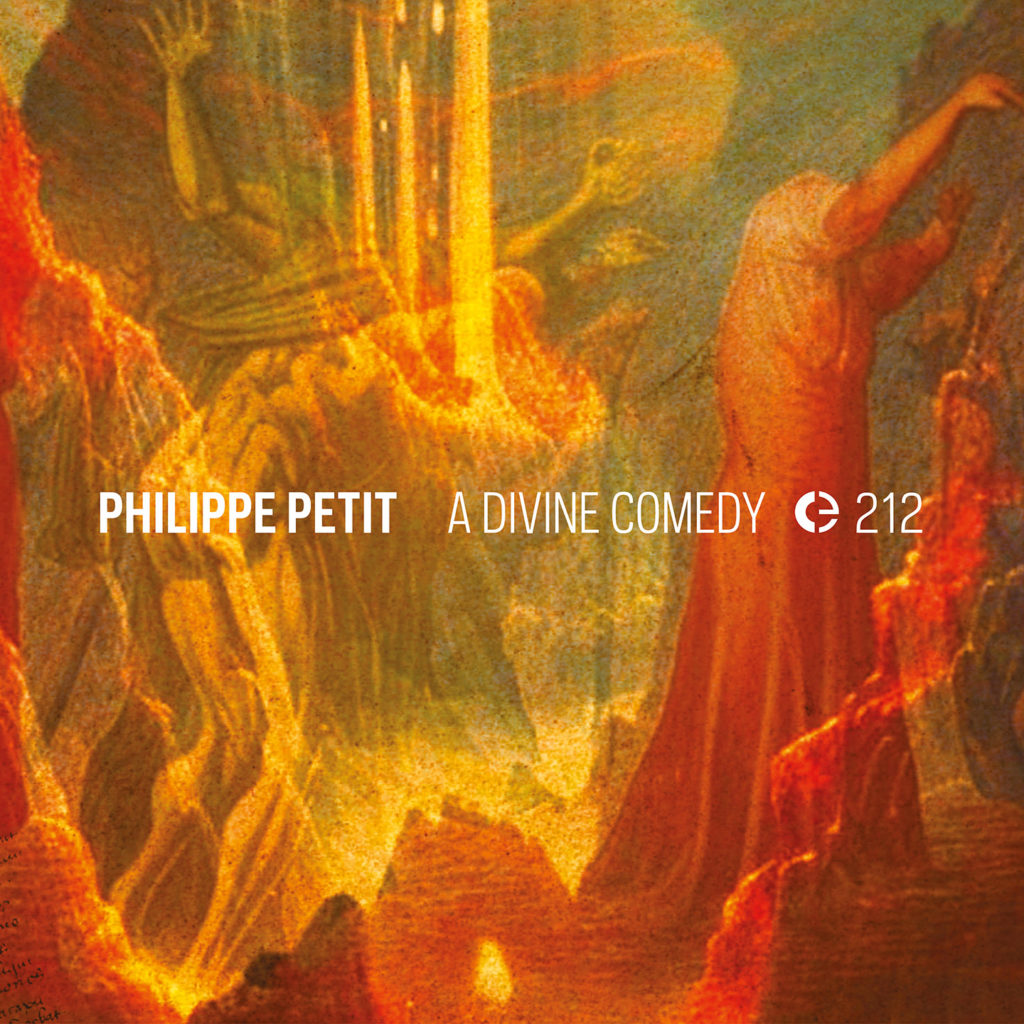
Impressive two-disc composition by Philippe Petit on A Divine Comedy (CRÓNICA 212-2024).
This Marseilles fellow has certainly come a long way since he started out as a DJ, radio presenter and zine publisher in the 1980s, even eclipsing his later label ventures for experimental electronica such as Pandemonium RDZ and BiP_Hop. This one is an ambitious project reflecting his studies at the CNRR Conservatoire, his mastery of multi-channel presentation and acousmatic spatialisation, and general use of modular synths. Yes, he’s taking on the classic works of Dante, covering everything from the Inferno to Purgatory and Paradise, a theme also highly popular with visual artists…not just Gustave Doré, but the English painter and book-maker Tom Philips, who nearly bankrupted his accounts producing his lavish art book version, and the maverick cartoonist Gary Panter who produced remarkable visual and literary statements when he cast his own cyber-punk character Jimbo as an unlikely hero to re-enact these epic voyages into the unknown.
Of course our man Petit is well aware of all such histories, and takes pains to distance himself from them to some extent; he does not want to adhere too closely to the original text of Dante, nor to tell a story, but rather to follow the precepts of Expressionism and see how far he can get riding on the back of that wild tiger. To put it another way, he wants his sumptuous sounds to “project subjectivity”, and “deform reality”, in order to produce highly emotional responses in the audience – sentiments likely to be endorsed by 20th-century painters such as Kirchner, Munch, Kandinsky, and Marc. Petit is also well-informed about the history of formal electro-acoustic experiments, and refers specifically to Divine Comédie, en epic work composed I think around 1971-72 by two titans of the genre, Bernard Parmegiani and François Bayle. (I’m surprised not to have heard of this meisterwerk sooner, but it only came out on CD in 1995, and was recently put onto four vinyl LPs by Recollection GRM.) Philippe Petit does not dismiss these grand masters out of hand, but his perception is that they were aiming for a sort of “soundtrack” of the afterlife, acting like Walter Murch providing sound design for an imaginary 1970s cinema project of Coppola that never existed.
Interestingly, it seems Franz Liszt has proven the better template for Petit’s purposes, proposing a “symphony” form based on the main stations of the arduous journey which Dante and Virgil must undertake. Petit also went back to Doré, building up a library of sounds and tones by using his imaginative powers to devise “musical pigments” from what he could see. At all times, the aim has been to keep things dynamic, a music in constant motion; perhaps it’s the danger of stasis, often associated with overly-literal illustrative techniques, that he was trying to avoid. Cases in point might be Le Livre Des Morts Égyptien or Apocalypse De Jean, both composed by Pierre Henry; no doubt they scrupulously honoured the truth of their sources, be they drawn from cartouches or New Testament texts, but somewhere they failed to ignite the passions we might associate with these very strong themes of the afterlife and the end of the world. Conversely, Philippe Petit – even though he gets a bit carried away with notions of “magic illusions” and “aural trickery”, as he attempts to convince us of the profound nature of his transformations – has turned in an exciting, powerful, and imaginative work. Those of a macabre bent (like myself) will no doubt savour the juicy, uncanny noises to be found on the Inferno disc, especially the vivid portrait of Lucifer, but there is also much to recommend on the more considered and atmospheric emanations for Purgatorio and Paradiso, where the audio pyrotechnics give way to restrained, focussed compositions of distilled intensity.
As a last word, I might remind the reader about Vidna Obmana and his Dante Trilogy, a 2001-2004 work that was reissued recently in Poland. The Belgian, lui, paid scant attention to the Dante texts, but did succeed in creating memorable dark ambient billows that were highly suited to the theme. From 2nd January 2024. Ed Pinsent
